
Assalamualaikum and good night everyone, welcome to the Steemit Crypto Academy season 4. Tonight I will write a post about Sidechains as a homework post for professor @pelon53 and this is my tenth post in this season.
The professor has explained about Sidechains in the learning post that has been shared with this community and now it's time for students to finish the homework that has been given, there are four main questions that must be answered in this homework and I will try to answer them in this post. I am very enthusiastic to start it because this is new knowledge for me.

Q1.) Explain in detail the Sidechains with the use of ZK-Rollups
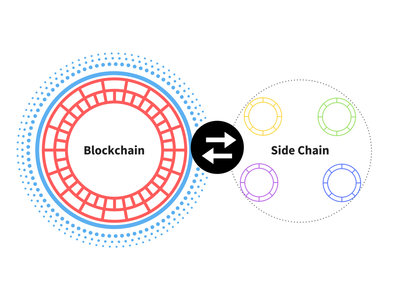
Scalability is one of the problems that exist in blockchain networks and Sidechains is present as one of the great innovations to solve this problem in blockchain networks and becomes a very useful alternative that allows the process of cryptocurrency transactions between two different blockchain networks to run smoothly. For security reasons, the cryptocurrency transaction procedure in this case must first go through a confirmation process with a certain waiting time. As such, Sidechains are closely related to the main blockchain, such as ZK-Rollups which is closely related to the Ethereum blockchain and Liquid Network which is closely related to the Bitcoin blockchain.
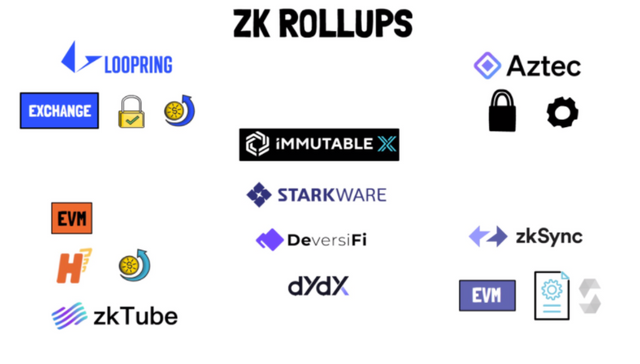
As Sidechains on the Ethereum blockchain, ZK-Rollups can process hundreds of transactions into one transaction with a gas fee that tends to be lower so it is hoped that scalability problems that occur on the Ethereum blockchain network can be resolved properly. All transactions are deconstructed and verified by smart contracts and Zero Knowledge Proof will validate each transaction as a publicly accessible transaction record. By simplifying the number of transactions, the amount of data stored in one transaction becomes more effective so that the total computing resources and the amount of storage space required can be minimized.
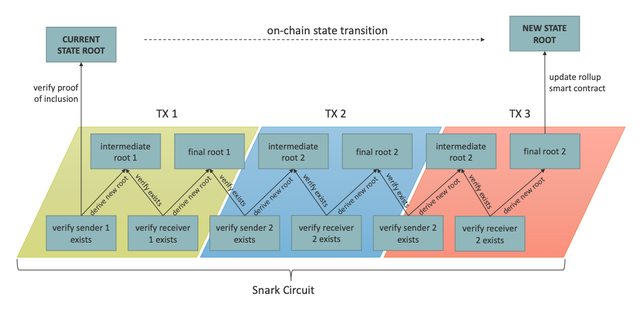
There are five main elements in a transaction process consisting of the sender's address, the recipient's address, the number of transactions, network fees, and the nonce number, while users are grouped into two categories, namely parties who make transactions or are called transactors and parties who ratify it or are called relayers. As temporary users, transactors will perform a certain transaction and send it to the network so that it can be properly validated. All transaction data will be stored in two Merkle Trees based on the smart contract that has been used for each transaction with details that addresses in one and transfer amounts in the other.
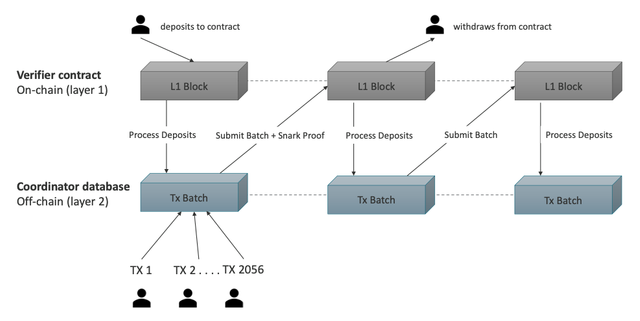
As the party authorizing the transactions, Relayers will form a Rollup by collecting a number of transactions that are transmitted to the network and then their main task is to generate SNARK Proof as evidence that shows the difference between the current and previous Hash states. Each user can become Relayers on condition that they have staked the requisite bond in the smart contract so as to prevent Rollup delays and by holding this big responsibility, Relayers are expected to work as well as possible and always prioritize honesty because their performance can have an impact on security smart contract. Currently Commit-Verify has been proposed as an implementation because SNARK Proof is sometimes delayed by a number of blocks so that it can reduce the effectiveness of the block confirmation process.

Q2.) Explain the Sidechain Liquid Network
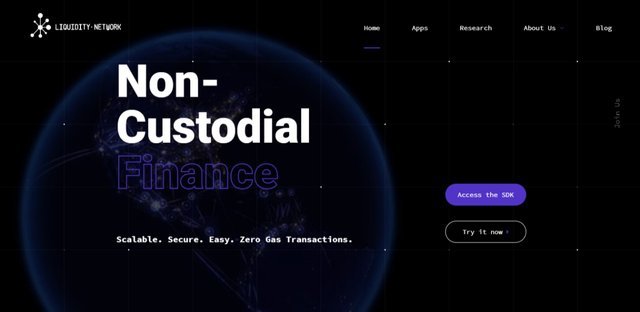
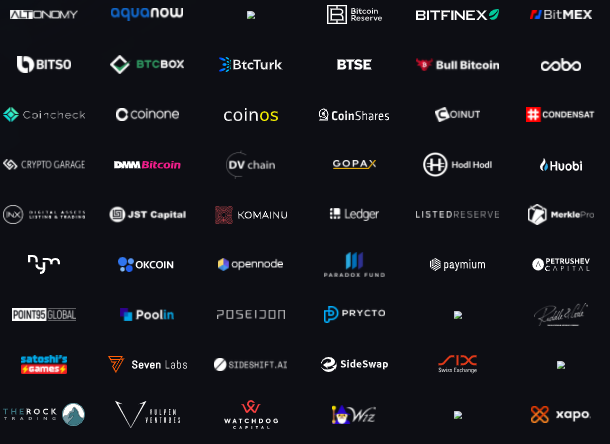
As Sidechains created with open source technology by Blockstream on the Bitcoin blockchain network, Liquid Network can process hundreds of transactions into a single transaction with transaction fees that tend to be lower so it is hoped that scalability problems that occur on the Bitcoin blockchain network can be resolved properly and also allow asset issuance. digitally so that users can create assets such as BTSE, Liquid Bitcoin, and Liquid USDT as examples of Liquid Assets that have been successfully created here. Liquid Network has a block time of one minute and transaction settlement in two minutes so it is suitable as an alternative to the Bitcoin blockchain network because it requires relatively less time. Currently Liquid Network has also collaborated with a number of great platforms such as Six Swiss Market, Bitbank, Bitfinex, Prycto, and Huobi.
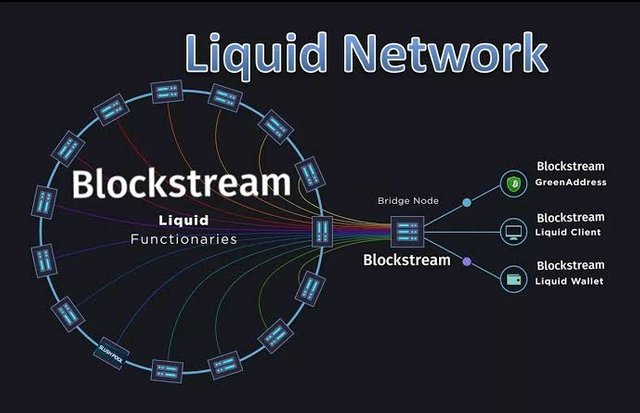
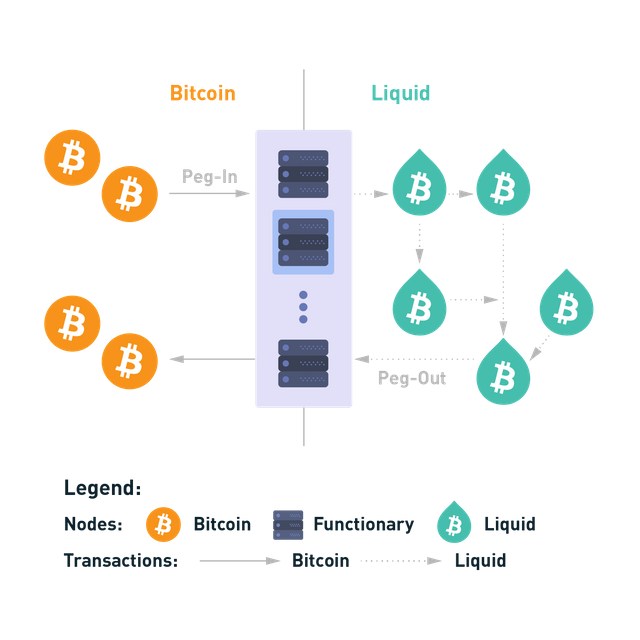
Each user in the Liquid Network is also responsible for network security because it is an independent entity. Blocksigner will track the block height for the block verification process while Watchman is in charge of securing Bitcoin with the Federation. The cryptocurrency transaction process from the Bitcoin blockchain to the Liquid Network is usually called a peg-in while the cryptocurrency transaction process from the Liquid Network to the Bitcoin blockchain is usually called a peg-out and the Bitcoin sent to the Liquid Network is called Liquid Bitcoin or LBTC whose value is always pegged to the same BTC value. with a ratio of 1:1. If a user will send 1 BTC to a destination address, the federation will first lock the asset temporarily on the Liquid Network until 102 confirmations are valid on the Bitcoin network and then the user will get 1 LBTC which is equivalent to 1 BTC.

As Sidechains contained in the Bitcoin blockchain network, Liquid Network has two main features, namely Private Transactions and Creation of Digital Currencies. Every transaction that occurs on the network can be accessed publicly, but by using the Private Transactions feature, users can hide their transactions from the public so that user privacy can be guaranteed, while the Creation of Digital Currencies feature can allow users to create certain digital assets as their own creations.

Q3.) Describe the steps to connect the Metamask wallet and the Polygon network wallet. (Show screenshots)
- Go to https://polygon.technology/ and a display like the following will appear. Click Use Polygon located on the main menu at the top of the page.
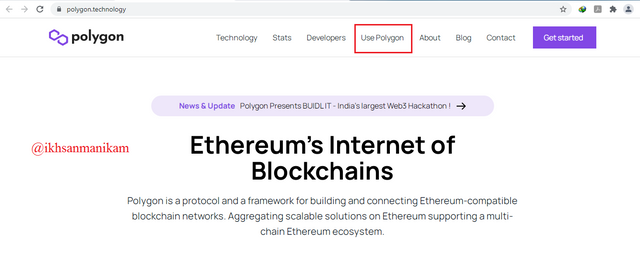
- Select Polygon Wallet.
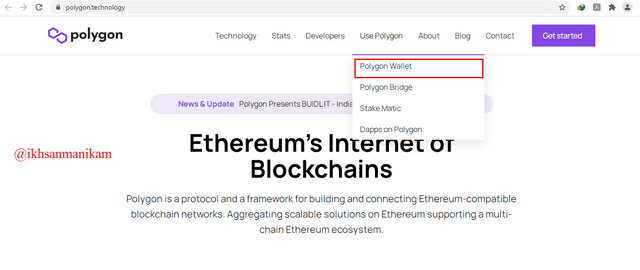
- Then a display like the following will appear and click Polygon Wallet again.
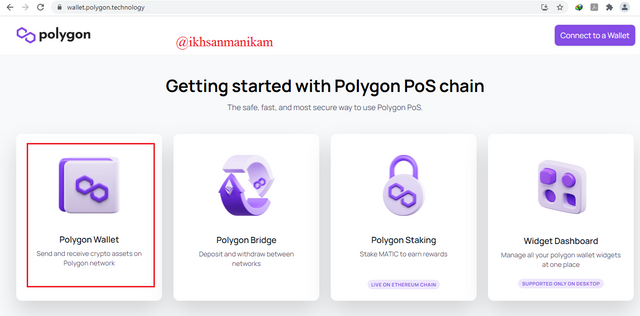
- After that a number of options will appear for connecting wallets, such as Metamask, WalletConnect, and Coinbase Wallet. Click Metamask to connect Metamask and Polygon.
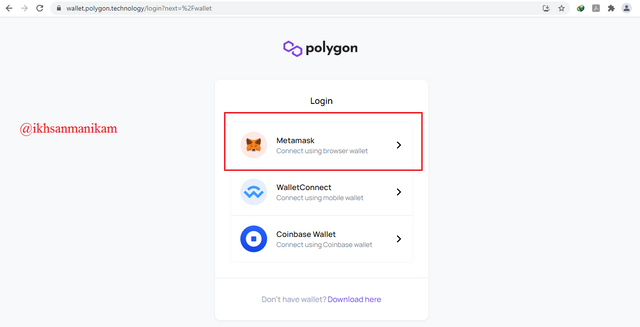
- Then select the Metamask wallet you want to connect and click Next.
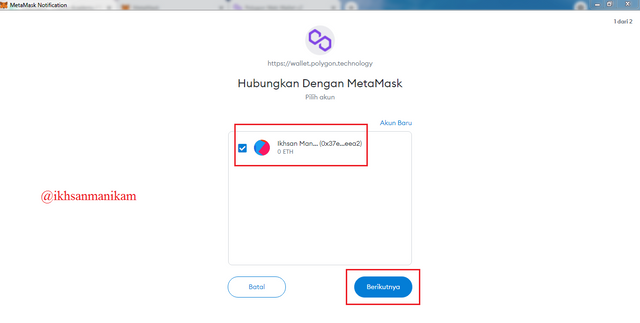
- Click Connect to continue.
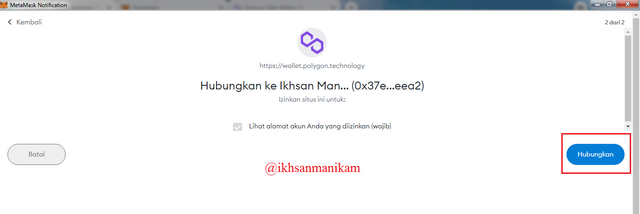
- Click Sign to confirm it.
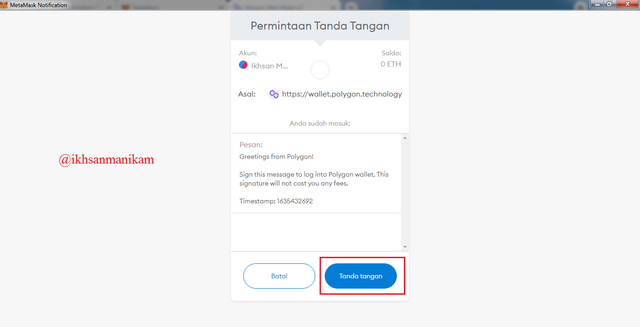
- The process has been completed and the Metamask wallet has been successfully connected to the Polygon network wallet. To prove it, you can see that the Metamask logo has appeared in the upper right corner of my Polygon wallet page, as shown in the image below.
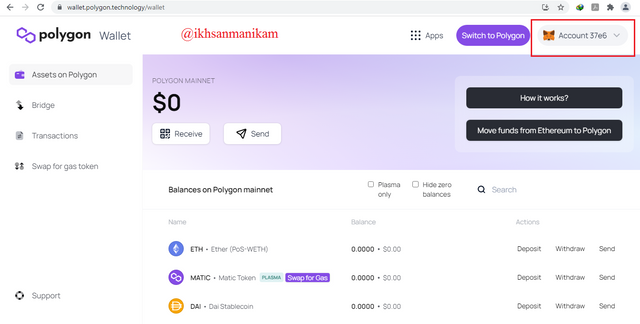

Q4.) According to the Polygonscan block explorer, when will the block 25,000,000 be generated? (Show screenshot). Explore the 12,000,000 block, at that time, what was the price of the Matic? (Show screenshots)
- Go to https://polygonscan.com/ and a display like the following will appear. On this page you can see the current price of MATIC is $1.94 and you can also see Latest Blocks and Latest Transactions.
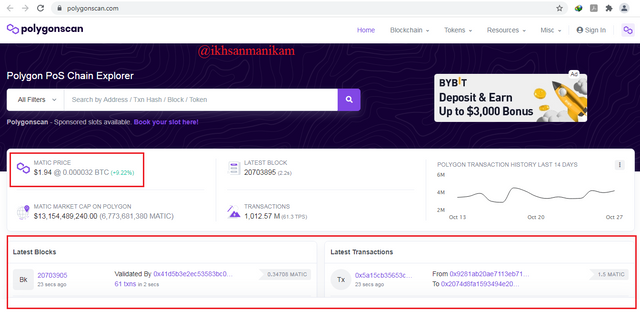
- Write 25000000 in the search field to check the estimated target date of the block.

- Then a display like the following will appear indicating that block 25000000 will be generated on Tuesday February 15 2022 05:30:00 GMT+0700 based on Indonesian local time or equal to 109 Days 09 Hours 20 Mins 59 Secs.
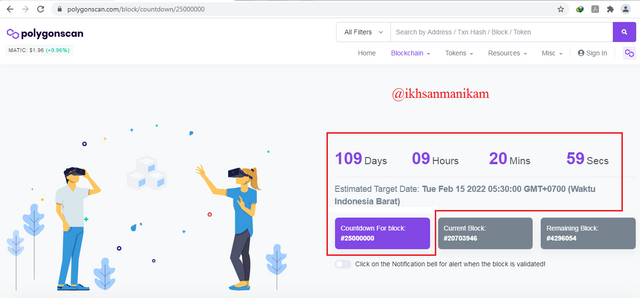
- Write 12000000 in the search field to check the MATIC price at the time the block was generated.

- Then a display like the following will appear showing that the MATIC price at the time the 12000000 block was generated was $0.38.
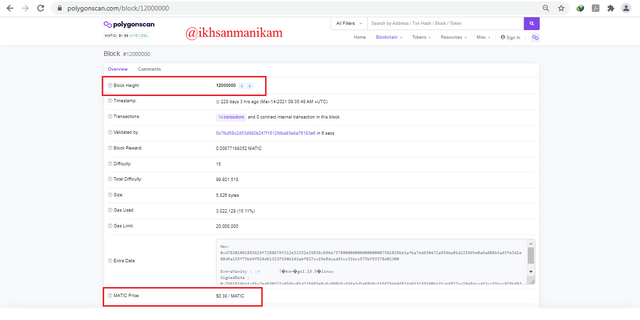

One of the problems that exist in blockchain networks is Scalability and Sidechains are present as an alternative to solve this problem in blockchain networks. Sidechains are very beneficial for every user because they allow the process of cryptocurrency transactions between two different blockchain networks to run smoothly. Sidechains also have fairly good security standards and transaction procedures because each transaction must first go through a confirmation process with a certain waiting time. As such, Sidechains are closely related to the main blockchain, such as ZK-Rollups which is closely related to the Ethereum blockchain and Liquid Network which is closely related to the Bitcoin blockchain. Each user can choose Sidechains based on their considerations because each Sidechains has its own advantages and disadvantages. Thankyou Professor for this amazing season!!
Posts that were before and after my post had received upvotes from steemcurator02 since a few days ago and only my posts did not get upvote in this queue, it seems steemcurator02 have missed my post. I think there is an error in this case. Please pay attention and thank you for your attention.
Cc: @steemcurator02
CC: @pelon53
Downvoting a post can decrease pending rewards and make it less visible. Common reasons:
Submit
Maybe you changed your tag
Downvoting a post can decrease pending rewards and make it less visible. Common reasons:
Submit
Saludos, ok. Ten paciencia.
Downvoting a post can decrease pending rewards and make it less visible. Common reasons:
Submit